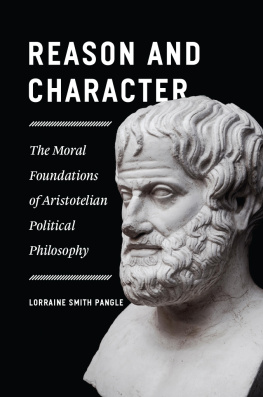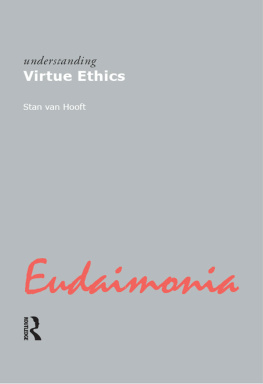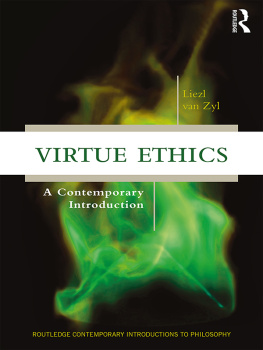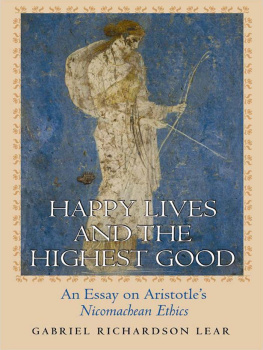Routledge Library Editions: Ancient Philosophy
Volume 6
VIRTUE AND KNOWLEDGE
Virtue and Knowledge
An Introduction to Ancient Greek Ethics
William J. Prior
First published in 1991
by Routledge
This edition first published in 2017
by Routledge
2 Park Square, Milton Park, Abingdon, Oxon OX14 4RN
and by Routledge
711 Third Avenue, New York, NY 10017
Routledge is an imprint of the Taylor & Francis Group, an informa business
1991 William J. Prior
All rights reserved. No part of this book may be reprinted or reproduced or utilised in any form or by any electronic, mechanical, or other means, now known or hereafter invented, including photocopying and recording, or in any information storage or retrieval system, without permission in writing from the publishers.
Trademark notice : Product or corporate names may be trademarks or registered trademarks, and are used only for identification and explanation without intent to infringe.
British Library Cataloguing in Publication Data
A catalogue record for this book is available from the British Library
ISBN: 978-1-138-20063-0 (Set)
ISBN: 978-1-315-47325-3 (Set) (ebk)
ISBN: 978-1-138-69737-9 (Volume 6) (hbk)
ISBN: 978-1-138-69739-3 (Volume 6) (pbk)
ISBN: 978-1-315-52205-0 (Volume 6) (ebk)
Publisher's Note
The publisher has gone to great lengths to ensure the quality of this reprint but points out that some imperfections in the original copies may be apparent.
Disclaimer
The publisher has made every effort to trace copyright holders and would welcome correspondence from those they have been unable to trace.
VIRTUE AND KNOWLEDGE
An Introduction to Ancient Greek Ethics
William J. Prior
First published 1991
by Routledge
11 New Fetter Lane, London EC4P 4EE
Simultaneously published in the USA and Canada
by Routledge
a division of Routledge, Chapman and Hall, Inc.
29 West 35th Street, New York, NY 10001
1991 William J. Prior
Printed in England by Clays Ltd, St Ives plc
All rights reserved. No part of this book may be reprinted or reproduced or utilized in any form or by any electronic, mechanical, or other means, now known or hereafter invented, including photocopying and recording, or in any information storage or retrieval system, without permission in writing from the publishers.
British Library Cataloguing in Publication Data
Prior, William J.
Virtue and knowledge: and introduction to Ancient Greek ethics.
1. Ethics. Ancient Greek theories
I. Title
170'.938
Library of Congress Cataloguing in Publication Data
Prior, William J.
Virtue and knowledge: an introduction to ancient Greek ethics/William J. Prior.
p. cm.
1. Ethics, Greek. I. Title.
BJ16l.P72 1991
170'.938-dc20
89-49680
ISBN 0-415-02470-6
ISBN 0-415-05324-26 pbk
This book is dedicated to my children.
Contents
There has been a recent revival of interest among philosophers in the ethics of virtue. Alasdair MacIntyre, Philippa Foot and others have argued that an ethical theory based on the concept of virtue is superior to its main modern competitors. This revival has led to renewed interest in the works of the ancient philosophers such as Plato, Aristotle, the Stoics and the Epicureans, who originated "virtue ethics" and remain among its finest exponents. Unfortunately, however, the contemporary reader is apt to lack an understanding of the cultural context in which these works were written. I have written this book to bridge the gap between the contemporary student and the ancient texts.
This is not a book for scholars. The reader will find in it no footnotes, no discussion of scholarly controversies, no extensive bibliography. I wrote it instead for beginners in philosophy who want to understand some of the great classical works on ethics. I have aimed it specifically at my own students in introductory philosophy courses, but I hope it will prove useful to the general reader as well. I am aware that some of the things I say are controversial in scholarly circles, and in particular that I draw a more "intellectualist" picture of Aristotle's view of happiness than do most scholars. I felt, though, that engaging in scholarly debate would not be profitable for the intended audience of the book. To put matters succinctly, those scholars of ancient philosophy who read the book will know where my interpretations differ from those of others; non-scholars will appreciate having a straightforward interpretation that does not digress into such matters.
I have limited my discussion to the most important and widely read ancient works on the subject. I have not tried to discuss every aspect of these works, rather, I have focused on the concepts of virtue, knowledge and happiness. The question of the relation among these concepts is a central theme of ancient ethical thought, and it is also one that any theory of virtue, ancient or modern, must consider. No other topic is so well suited, I think, to bring out both the continuity and the specific differences in ancient ethics.
My decision to write a book on ancient ethics is based on personal convictions. Since the reader will not find a defense of these beliefs in the book, I think it only fair that I should state them here. I agree with those contemporary philosophers who find in the ethics of virtue a superior way of thinking about moral philosophy. I also believe in the enduring merit of the writings of the ancient philosophers on this subject. I do not think that they have had the last word; I believe that the ancient approach to ethics is overly rationalistic and needs to be supplemented by a greater appreciation of the positive role the emotions play in ethics. None the less, it seems to me that the study of ancient philosophical ethics is an indispensible part of liberal education.
Ancient Greece produced some of the greatest philosophers who ever lived. Their writings on ethics are unsurpassed in philosophical merit. Moreover, their central theme is of interest to every thoughtful person. Though they sometimes contain abstract philosophical discussions that can confuse or intimidate the novice, their primary focus is on practical questions that everyone needs to reflect on. Though the modern world differs in many respects from the ancient society for which these thinkers wrote, their works can still provide a practical guide to living the good life. For this reason alone every educated person ought to read them.
I would like to express my gratitude to Malcolm Schofield for his helpful comments on an earlier draft of this book, and to my research assistant, Douglas Gabbard, for his careful proofreading of the manuscript.
Santa Clara, California
July, 1989
The material quoted from Aristotle's Nicomachean Ethics, translated by Martin Ostwald, is reprinted with permission of Macmillan Publishing Company. Copyright 1962: renewed 1986 by Macmillan Publishing Company. The quotations from The Iliad of Homer, translated with an introduction by Richard Lattimore, are reprinted with permission of the University of Chicago Press. Copyright 1951 by the University of Chicago. The lines from Sophocles' Antigone, translated by Elizabeth Wyckoff, are reprinted with permission of the University of Chicago Press. Copyright 1954 University of Chicago. The lines from Sophocles' Oedipus the King, translated by David Grene, are reprinted with permission of the University of Chicago Press. Copyright 1942 by the University of Chicago. The selections from The Manual of Epictetus , translated by P. E. Matheson, are reprinted with permission of Oxford University Press. The selected passages from Diogenes Laertius' Lives of Eminent Philosophers, vol. 2, translated by R. D. Hicks, in the Loeb Classical Library (first published 1925) are reprinted with permission of Harvard University Press.
















